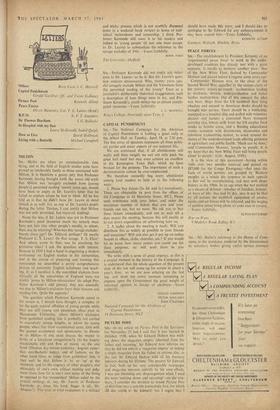Milton Boris Ford. J. C. Maxwell
Capital Punishment Gerald Gardiner, QC, and Victor Gollancz
Picture Post Kenneth Allsop Peace Forces
Olwen Battershy, Col. T. L. Laister (Reid.)
R.P.M. N. F. T. Saunders Sir Thomas Beecham J. G. Bullock('
In Hospital with my Son Laura McDonald, Isabel Quigly
How to Live David Holbrook Living with a Butterfly Michael Campbell
MILTON
SIR,---Myths are often an unconscionable time dying, and in the field of English studies none have proved so intolerably hardy as those associated with Milton. It is therefore a great), pity that Professor Km-mode, having brought forth the weary old myth that Milton was 'savagely excluded from [young people's] permitted reading' twenty years ago, should have been so angry at Dr. Leavis's letter that he failed to explain whom he had in mind. All he has told us is that he didn't have Dr. Leavis in mind (which is as well; for, as one of Dr. Leavis's pupils during the latter Thirties, I can testify that Milton was not only permitted, but required, reading).
None the less, if Dr. 1.cavis was not in Professor Kermode's mind (however much his remark must have put him into other people's minds), to whom. then, was he referring? Who-was this 'savade excluder' twenty years ago? Dr. Tillyard, perhaps? Or maybe Professor C. t. Lewis? Or that savage. T. S. Eliot? And where, come to that, was he practising his primitive rites? I ask the question with interest, because in 1939 1 had a hand in organising a student conference on English studies in the universities. and in the course of preparing and running this conference we assembled a pretty comprehensive picture of university English syllabuses and teach- ing. I. as I recollect it, the assembled students from virtually all the universities of England were not visibly 'prone to Milton-intoxication' (to adapt Pro- fessor Kermode's odd phrase), that was assuredly not due to Milton's exclusion from their lectures and reading-lists. Quite the opposite!
The question which Professor Kermode raised in his review is, I should have thought, a complex of (a) the quite natural affinities of young people while they arc still young and passionate (thus even in . Manchester University, where Milton's exclusion from permitted reading lists is probably not carried to excessively savage lengths, to whom do young People, when free from examination cares. turn with the greater excitement and spontaneity, to Donne or to Milton—if one must discuss the matter in terms of a knockout competition?); (b) the largely incalculable ebb and flow of mood, on the one hand (Thomas day-before-yesterday, Angries, yester- day, neo-Beeketts today), and of fashion. on the other hand (thus, to judge from publishers' lists, it may well be that Milton is 'in' or 'up' at the moment); and (c) the cogency of other people's. and ultimately of one's own, critical reading and judg- ment (thus, how far is one's own sense of the living as opposed to the 'mummified' Milton aided by the critical writings of. say. Dr. Leavis or Professor Kermode or. since his book began it all, Mr. Alvarez?). 1 his kind of total evaluation is a delicate
and tricky process which is not worthily discussed (even in a weekend book review) in terms of indi- vidual malevolence and censorship. I think Pro- fessor Kermode still owes it to his readers and indeed to 'young people' (if not, one must accept, to Dr. Leavis) to substantiate his reference to the savage excluder of 1941.—Yours faithfully,
BORIS roitp
The University. Sheffield






































 Previous page
Previous page